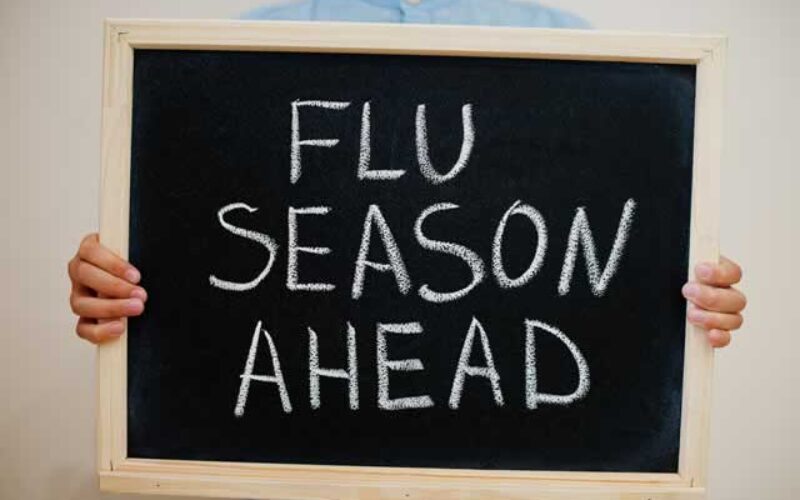Living, studying, and socializing in close quarters like dorms, lecture halls, and dining commons creates an ideal environment for the flu virus to spread rapidly. Juggling classes, assignments, and a social life is already demanding; adding the flu to the mix can disrupt your entire semester.
This guide offers practical advice to help you stay healthy and navigate flu season successfully.
Understanding the Flu Virus
The influenza virus is highly contagious and spreads primarily through tiny droplets made when people with the flu cough, sneeze, or talk. These droplets can land in the mouths or noses of people who are nearby.
You can also get the flu by touching a surface or object that has the flu virus on it and then touching your own mouth, nose, or possibly your eyes. On a bustling college campus, where students are constantly interacting, the risk of transmission is significantly higher.
Knowing the difference between the flu and a common cold is important. Flu symptoms are usually more severe and come on suddenly. They often include fever or feeling feverish/chills, cough, sore throat, runny or stuffy nose, muscle or body aches, headaches, and fatigue.
Some people may have vomiting and diarrhea, though this is more common in children than adults. Complications from the flu can be serious, leading to pneumonia, bronchitis, and sinus infections, which can result in missed classes, falling behind on coursework, and even hospitalization in severe cases.
Preventive Measures for College Students
Taking proactive steps to protect your health is the most effective way to avoid getting sick. By incorporating a few key habits into your routine, you can significantly reduce your risk of catching the flu.
These measures include getting vaccinated, practicing good hygiene, maintaining a healthy lifestyle, and being mindful of your social interactions.
Vaccination
The single most important step you can take to prevent the flu is to get an annual flu shot. The flu vaccine works by causing your body to develop antibodies that provide protection against the influenza viruses included in the shot.
It takes about two weeks for these antibodies to develop, so it’s best to get vaccinated early in the fall, before the flu season is in full swing. Many college campuses offer free or low-cost flu shot clinics for students.
You can check your university’s health services website for clinic dates and locations. Local pharmacies and community health centers are also convenient options.
Hygiene Practices
Practicing good hygiene is a simple yet powerful way to prevent the spread of germs. Wash your hands frequently with soap and water for at least 20 seconds, especially after coughing, sneezing, or being in crowded public spaces. If soap and water aren’t available, use an alcohol-based hand sanitizer that contains at least 60% alcohol.
Also, make a conscious effort to avoid touching your face, particularly your eyes, nose, and mouth, as this is a common way for germs to enter your body. Keeping your living space clean, especially high-touch surfaces like doorknobs, desks, and phones, can also help reduce the spread of the virus in a shared dorm room.
Healthy Lifestyle
A strong immune system is your body’s best defense against illness. You can support your immune system by maintaining a healthy lifestyle, even with a demanding college schedule. Prioritize getting enough sleep—aim for seven to nine hours per night—as lack of sleep can weaken your immune response.
Eat a balanced diet rich in fruits, vegetables, and whole grains, which provide essential vitamins and nutrients. Regular physical activity also boosts your immune system, so try to incorporate at least 30 minutes of moderate exercise into your daily routine.
Managing stress through activities like yoga, meditation, or spending time with friends can also contribute to your overall well-being.
Social Distancing
Being mindful of your physical distance from others can help prevent the spread of the flu. If you notice someone is sick, try to maintain a respectful distance. If you start to feel unwell yourself, it is crucial to limit your contact with others to prevent transmitting the virus.
This can be challenging in a dorm setting, but simple steps can make a difference. Stay in your room as much as possible, wear a mask if you need to be around your roommates or in common areas, and avoid large social gatherings.
If you must attend class, sit away from others if possible and wear a mask. Inform your professors about your illness; many are understanding and can provide accommodations for missed work.
Campus Resources and Support
Your university is invested in your health and provides numerous resources to help you stay well. Campus health services are your first point of contact for medical advice and treatment. These centers are staffed with healthcare professionals who can diagnose your symptoms, provide treatment, and offer guidance on how to manage your illness while keeping up with your studies.
Many health centers offer flu testing and antiviral medications if prescribed. Check your university’s health services website or call them to learn about appointment scheduling, walk-in hours, and what to do if you think you have the flu. They can also provide you with a doctor’s note if required by your professors.
other related articles of interest:
Thriving in College The Ultimate Guide to Student Health and Wellness
Prioritize Your Health This Season
Navigating flu season on a college campus requires awareness and proactive effort. By getting vaccinated, practicing good hygiene, maintaining a healthy lifestyle, and using campus resources, you can significantly lower your risk of getting sick.
Taking these steps not only protects your own health but also contributes to a healthier campus community for everyone. Making your well-being a priority will allow you to stay focused on your studies and enjoy all that college life has to offer, without the interruption of the flu.
Image Credit: flu season on campus by envato.com
end of post … please share it!
PAYING FOR COLLEGE: getting the aid you need
-------------------------------------------------------------------------------------------------------------
end of post idea
-------------------------------------------------------------------------------------------------------------
view home improvement ideas at our Photo Remodeling center











